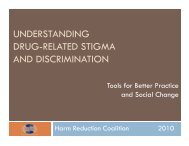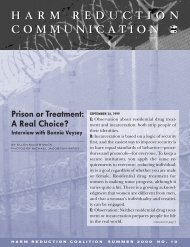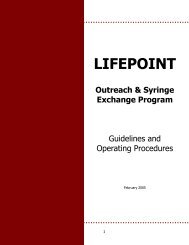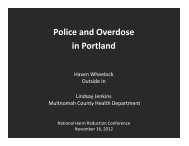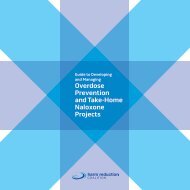9th - Harm Reduction Coalition
9th - Harm Reduction Coalition
9th - Harm Reduction Coalition
You also want an ePaper? Increase the reach of your titles
YUMPU automatically turns print PDFs into web optimized ePapers that Google loves.
<strong>9th</strong><br />
National <strong>Harm</strong> <strong>Reduction</strong> Conference<br />
FROM PUBLIC HEALTH TO SOCIAL JUSTICE<br />
Devine, Elizabeth, Veterans Administration, Tacoma, WA<br />
elizabeth.devine2@va.gov<br />
<strong>Harm</strong> <strong>Reduction</strong> in VA Supportive Housing<br />
Transition to the Housing Fist Model in the Puget Sound Veterans Administration Supportive Housing Program (“VASH”) has<br />
involved cooperation and support from local public housing agencies, landlords, government partners, and non-government<br />
community partners, as well as rethinking what constitutes “readiness” for housing. We now serve Veterans who still struggle<br />
with substance use disorders, many of whom have mental health and medical issues as well. Our presentation focuses<br />
on <strong>Harm</strong> <strong>Reduction</strong> as a crucial part of our work with these Veterans<br />
Elizabeth R. Devine, LICSW, CDP is the Clinical Supervisor for the VA Supported Housing Program (VASH) at the American Lake<br />
VA. She received her MSW from the University of Washington in 2004. She has also earned a Certificate in Psychological Trauma;<br />
is a Chemical Dependency Professional; and has additional training in psychodynamic psychotherapy. Elizabeth’s Social Work<br />
practice has also included work with chronically mentally ill populations and managing housing for late-stage alcoholics.<br />
Dhokia, Poonum, Hepatitis Education Project, Seattle, WA<br />
poonum@hepeducation.org<br />
The Hepatitis C Case Management Program: Recommendations for Accessing Hepatitis Medical Care<br />
This year, the Hepatitis Education Project launched a hepatitis C medical case management program in Seattle, Washington.<br />
This program extends support to hepatitis C patients by linking them to appropriate medical care and social services. Since<br />
hepatitis C is transmitted through blood-to-blood contact, injection drug users comprise a significant part of the population.<br />
Studies have determined case management interventions a beneficial tool in linking recently diagnosed patients to medical<br />
care. Case management programs are inexpensive, highly utilized, and produce effective results. Patients enrolled in a case<br />
management program are more likely to receive early treatment; this is significant because hepatitis C has successful treatment<br />
options. This presentation illustrates barriers to accessing hepatitis medical care, outlines various components of a<br />
case management program that was developed to overcome these challenges, and suggests preliminary recommendations<br />
of such a program for the harm reduction community.<br />
As a California native, Poonum earned her MPH from the University of Southern California and spent one year as a Fulbright<br />
scholar in India. She is an experienced project manager and researcher, with a passion for innovative approaches to health education.<br />
At the Hepatitis Education Project, Poonum is responsible for planning, implementing, and maintaining the Hepatitis C<br />
Medical Case Management program.<br />
Di Meo, Rebecca, Streetwork Project, Milwaukee, WI<br />
rebecca.dimeo@safehorizon.org<br />
The Gray Areas of Rape: A <strong>Harm</strong> <strong>Reduction</strong> Approach.<br />
Through my work as the <strong>Harm</strong> <strong>Reduction</strong> Coordinator at the Streetwork Project, a youth program of Safe Horizon, I work<br />
with runaway and homeless youth focusing in the areas of sexual health, trauma, and drug use through counseling and<br />
group facilitation. In my work with youth I have found that discussing consent is critical to understanding sexual health,<br />
but because of the ways that sexual trauma is stigmatized in our society, it is often difficult to address the topic at all. By<br />
taking a <strong>Harm</strong> <strong>Reduction</strong> approach to the issue I often bear witness to youth who have experienced sexual assault, as they<br />
take steps in working through their trauma and preventing further harm. I have found that the subject of rape and sexual<br />
assault can be accessed most effectively by beginning with a discussion about sexual consent and asking questions that do<br />
not assume someone’s individual experience with the issue. By approaching the topic of sexual consent without judgment,<br />
32



